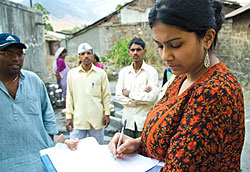 |
Barring socioeconomic or political catastrophe, even countries like Nepal can pair the acknowledgement that 'there is much to do' with 'but look how far we have come'. Successive reports reveal that maternal and child mortality rates have been slashed, life expectancy and literacy rates are on the rise, and GDP is growing year by year. But what if these statistics were, as some would have it, pretty lies?
National accounts data provides the most comprehensive overview of a country's economy. Governments use them to formulate budgetary policies, central banks to make monetary decisions, businesses to make investment decisions and financial institutions to make portfolio allocations.
It's clear that if this data is outdated and inaccurate, the decisions that depend on them will be flawed and even disastrous. The quality of statistics in Nepal is dubious because the Central Bureau of Statistics (CBS) doesn't conduct surveys regularly, and the surveys that exist employ poor methodology.
Quarterly rather than annual national estimates are particularly useful for policymakers. CBS has long been compiling annual national accounts, but Nepal may be the only country in South Asia that does not compile them quarterly. Besides the two decennial population and agricultural censuses, the only household level surveys being conducted by CBS are the Labor Force Survey (LFS) and the Nepal Living Standard Survey (NLSS).The discontinuation of the only annual regular survey of manufacturing establishments has left little base for the estimation of value added and other aggregates.
Agricultural data is unreliable because surveys aren't scientific but based on ad hoc field reports. Monetary statistics cover Nepal Rastra Bank and commercial banks but ignore finance companies. The official inflation figure of 13 per cent is inaccurate because the consumer price index does not capture all items, data is collected only from urban centres and does not reflect changing patterns of consumption. Likewise, balance of payments statistics are incomplete and data collection on remittances, foreign direct investment, records of grants, loans and oil transactions, re-exports, short-term inflows, and other private capital flows is seriously flawed.
Matters get worse when you turn to the informal economy, which is even more important for Nepal than the formal economy. The LFS 2008 reveals that about 96 per cent of Nepalis are employed in the informal sector, which contributes over 51 per cent of total GDP. But many economic transactions are not observable or directly measurable, particularly in the case of those working at home.
This has serious implications for government policy. Official GDP estimates are significantly underestimated and the calculation of the rate of change of economic growth is equally inaccurate. The Ministry of Finance loses billions of rupees as tax revenue each year, raising the tax burden on those who pay tax and reducing the amount available for governments to spend on public goods. Inaccurate data means government policy is based on inappropriate targets.
Statistics has never been a priority for sucessive governments. Until governments allocate adequate resources to conduct regular, rigorous surveys of both the formal and informal sectors, the statistics on which government policy is based simply cannot be taken at face value. Investment in statistics is no less important than investment in infrastructural development.
From 23-26 September, the South Asian Institute of Management (SAIM) and the International Association for Income and Wealth (IARIW) will be organising an international conference in Kathmandu on Measuring Informal Sector in Developing Countries. Participants from over 40 countries are expected to discuss the problems relating to the collection of statistics in the informal economy. Behind the scenes, statisticians are working hard to fortify the database so necessary to sound policymaking.
Bishnu Dev Pant is the former Director of the Development Indicators and Policy Research Division of the ADB in Manila. He is now director of the newly established Centre for Economics and Applied Statistics of the South Asian Institute of Management.
READ ALSO:
How far we lag behind - FROM ISSUE #465 (21 AUG 2009 - 27 AUG 2009)



